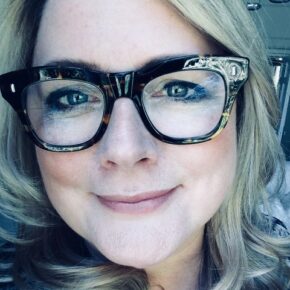Q – Hi Caroline, and thanks for joining us. To start, can you tell us about your role in the Bath Novel Award?
Caroline Ambrose – It’s a pleasure! So, my role in the Bath Novel Award team is to make sure we do the best possible job of finding the top five or six from the year’s entries.
I receive and read all entries to figure out which of our 20 professional readers the text best matches — we have a small and trusted handpicked team of editors, novelists, genre specialists and others who read for us.
The readers look at extracts (typically the first 5,000 words) and a one-page synopsis in the early stages. They read in batches and vote yes or no to the question ‘does this extract and synopsis make me excited to read the full manuscript?’
Those with the most votes go forward to a longlist. We then start again with the full-length pieces and keep going until we have a clear top few. These are then read by a literary agent judge who picks the winner.
The agent has a completely free choice, and I’m often wrong about winning books. At that stage the standard is so strong it can come down to personal taste on the agent’s part.
The winners of the adult prize include Joanna Barnard, whose novel Precocious sold in a four-way auction after being snapped up by agent Juliet Mushens. Joanna now reads for us and has spotted three out of three winners from the first round, which is interesting!
We’ve also had international winners like Clarissa Goenawan, an amazing Indonesian writer who has recently published Rainbirds.
Kim Sherwood’s Testament was released on 12 July 2018 as the lead title for Riverrun (Quercus), and I doubt ours will be the last award she’ll win. Our most recent winner Sophie Draper has landed a deal with Harper Collins for Cuckoo. We’re very proud of all of them.
We’re after the best book, period, so we have genre specialists and no agenda.
– Caroline Ambrose
Q – So it seems success in the Bath Novel Award can do wonders for a writer’s career!
CA – We do have a lot of interest from agents who’d like to judge and follow our lists, and I’m in regular contact with a few dozen of them about anything we’ve seen that I think might be a good fit – that’s part of the prize for shortlistees. I also often help writers navigate multiple offers from agents which can be a bit of a ride — especially if they’ve had lots of rejections in the past.
Q – Do you have any preference for genre or style?
CA – I hope we don’t have one! We’re after the best book, period, so we have genre specialists and no agenda. We’ve shortlisted sci-fi, fantasy, YA, literary, gothic, psychological suspense, historical, speculative, comedy and magic realism.
I make a real effort for my taste not to have a bearing on my judgement of entries, but personally I’m an avid reader of debuts and a big Pullman admirer.
Not all of our professional readers are writers. They are first and foremost brilliant readers. Our crime reader, for example, is a private eye.
– Caroline Ambrose
Q – How important are first impressions? Do you like something that hits you with full force straight away, or do ‘slow burners’ also have a chance?
CA – In the first round I very rarely get past the first page of the books which go on to longlist. I’m constantly asking myself ‘who’s the best reader for this?’ and I find that if I can think of lots of our team who will like it, it’s always a good sign.
If I’ve got to the end of the 5,000 words and I’m still struggling to think of someone who would like to read it, it’s rarely a good sign.
On that note, our professional readers include former winners and shortlistees, but they aren’t all writers.
They are first and foremost brilliant readers. Our crime reader, for example, is a private eye.
However, we’ve absolutely had ‘slow burn’ successes. I think that’s one of the ways we often find amazing books which have been rejected by agents, as the truly exciting stuff happens further into the book than a typical agent might read.
Two of our winners had really slow-burn starts which got reworked by their publisher.
The best books that truly catch my eye often open with immediate action and intrigue – however small.
– Caroline Ambrose
Q – Are there any common problems you come across when sifting through the entries?
CA – It’s very unusual for us to say no to something based on a first page, unless the subject matter would cause such offence that I’ve immediately known we couldn’t put our name to it.
I do have a bit of a pet hate about seeing the word ‘cacophony’ which everyone laughs at, but my judgement of a whole piece obviously wouldn’t come down to a single word!
The best books that truly catch my eye often open with immediate action and intrigue – however small. I’ve noticed the books which travel the furthest in the competition often start with a very simply worded first line full of action and intrigue.
For example, Friend Request by Laura Marshall began with something like: ‘The email landed in my inbox like an unexploded bomb.’
Q – Caroline, this has been great. Thanks for sharing the ins and outs of the Bath Novel Award with us!
CA – I’m glad it’s been useful! Good luck with your writing – perhaps I’ll see one of your names on the entry pile soon…
***
Sponsorships for low-income writers
Professional Writing Academy has sponsored five free entries into The Bath Children’s Novel Award 2018 for low-income writers. For more details, including how to apply, please visit the Bath Novel Award website.




